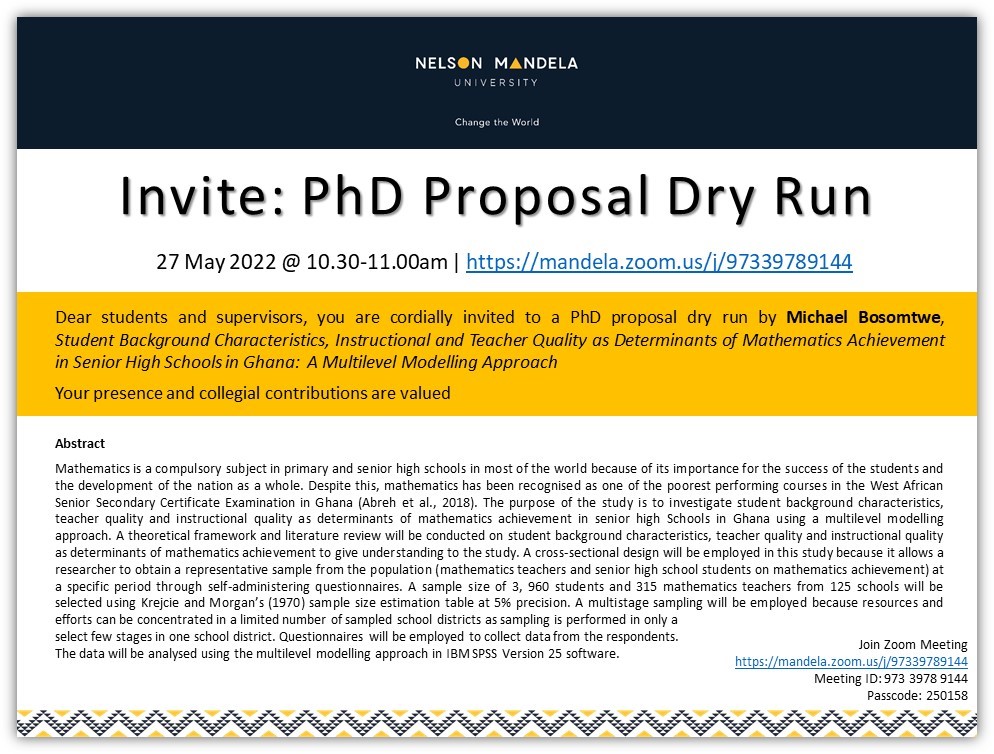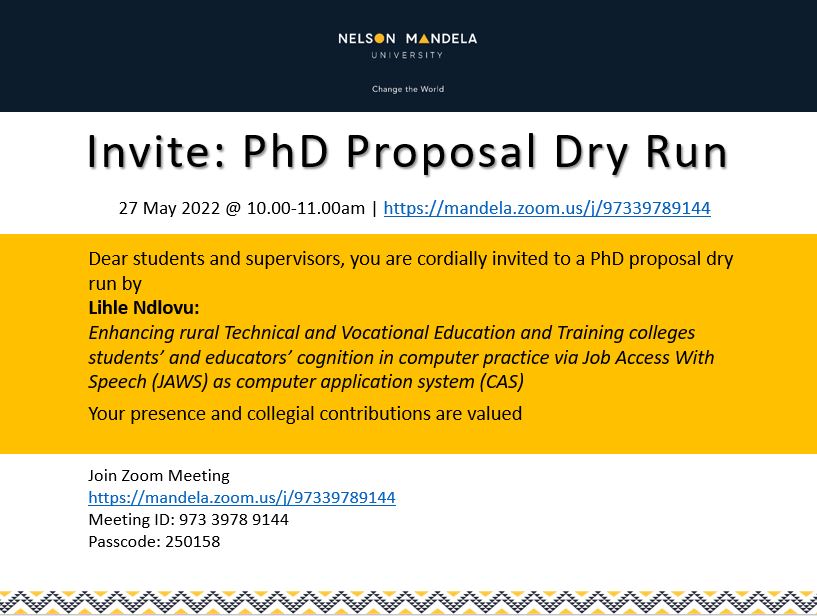Watch the recording of the PhD Proposal Dry run

Topic: PhD's Proposal Dry Run
Time: May 27, 2022 10:00
Join Zoom Meeting
https://mandela.zoom.us/j/97339789144
Meeting ID: 973 3978 9144
Passcode: 250158
Contact: Prof Anass Bayaga Anass.Bayaga@mandela.ac.za

Join Zoom Meeting
https://mandela.zoom.us/j/97339789144
Meeting ID: 973 3978 9144
Passcode: 250158
Abstract
Technical and Vocational Education and Training (TVET) colleges in South Africa are still in their infancy stage with the inclusion of students with visual impairments (SWVI) in the classrooms. While the inclusion requires the use of specialised computer application systems, Job Access With Speech (JAWS) has been identified as a commonly used screen-reader in supporting SWVI’s learning processes. Studies have noted that, due to SWVI’s and educators’ computer skills insufficiencies, institutions of learning resort to scribes’ employment as a human support system in complementing JAWS usage. As a result of scribe-acceptance, SWVI get deprived of a meaningful learning experience, which is independence-as the initial benefit for the existence of computer application systems such as JAWS.
However, most of such studies have been conducted in universities and schools in developed countries. Very little is known about the use and acceptance of JAWS amongst rural TVET educators and SWVI in South Africa. Therefore, the proposed study intends to investigate the effects of the use of JAWS as a computer application system in enhancing SWVIs’ and their educators’ cognition in rural TVET colleges. Also, to investigate SWVIs’ and educators’ perceptions and acceptance levels of JAWS as a consequence of participating in a computer practice lesson using JAWS.
Guided by an asset-based approach (ABA) and a technology acceptance model (TAM), a mixed method approach will be employed in data collection (qualitative and quantitative). Based on an estimated population of 150, purposeful sampling will select a sample size of 109 SWVI with their educators as participants. Participants will be from rural TVET colleges of KwaZulu-Natal, Eastern Cape and Gauteng provinces in the Republic of South Africa. The study will be an experimental design where participating SWVI and educators will further be randomly allocated into control and experimental groups. While quantitative data will be collected using a pre-test/post-test and a questionnaire, qualitative data will be generated using focused group discussions and analysed using thematic analysis.
Furthermore, quantitative data will use descriptive statistics and Partial Least Squares Structural Equation Modelling (PLS-SEM) as data analysis methods. PLS will be used to analyse SWI’s and their educators’ behavioural intention towards JAWS acceptance, also to assess if there is a significant difference between rural TVET SWVI and their educators path coefficients.
It is anticipated that the proposed study will not only equip TVET educators to get a glimpse understanding of SWVI’s learning processes in computer practice, but educators will also be in a position to transfer the same technology skills to their students before SWVI can further access their intended vocational content. Hopefully, competencies in technology skills will enhance levels of TVET educators’ self-efficacy and creativity in their inclusive teaching practices, and promote SWVIs’ learning independence.
Keywords: Technical and Vocational Education and Training (TVET) colleges, students with visual impairments, Job Access with Speech